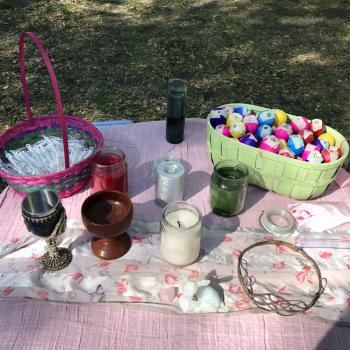Each week during Lent, I will reflect on the spirituality and vocation of pastors in light of the lectionary readings. Last week, I focused on Matthew 4:1-11, Jesus' retreat in the wilderness, as a call for pastors to pause awhile for prayer and meditation amid their busy Lenten schedules. This week, we are focusing on Genesis 12:1-9 as an invitation to create altars of transformation to nurture your prayer life.
The first thing you may have noticed is that I have taken liberties with the lectionary reading. Like many other lectionary readings, this one stops before the key passages. Whenever I notice a discrepancy between the lectionary selection and the spirit of the passage, I am quite comfortable with adding or subtracting a few verses from the given reading. I hope you consider this practice as one way to liberate the lectionary to more fully really God's wisdom in your life and your preaching.
The passage is an adventure story. In fact, Abraham and Sarah are invited to go on a holy adventure as they leave their familiar homeland to seek a promised, but uncharted, land. They are told that their lives will be in God's care and that God will bless them as a prelude to blessing others.
We pastors can feel a kinship with this aged couple: our ministry occurs in a rapidly changing, pluralistic, and uncertain world, whose contours would be unfamiliar to our grandparents, if not our parents. We journey forth in ministry toward a horizon, dotted by new religious movements, shrinking budgets, and a growing marginalization of the church in the marketplace of spiritualities.
The passage is obviously compressed. We can imagine that Abraham and Sarah wrestled for months with the call forward, weighing pros and cons, selling property, and reflecting on what they would give up in following the Voice. Adventure lured them forward but adventure involves risk as well as reward. Still, they eventually left their homeland and journeyed forth by stages, advancing toward the horizon of God's promises.
Along the way, they made a wondrous discovery. They found out that God journeyed with them and that the God who calls us to adventure is not limited by time, place, geography, or boundary lines. They also discovered practices of spiritual awareness. Wherever they stopped on their journey, they erected an altar to their adventurous God. I suspect that, at first, they erected these altars to invoke God's presence. Later, I believe, they erected altars as a reminder that God was with them every step of the way. God, who is not limited by time or place, was sharing their adventure, too.
The story of Abraham and Sarah is an invitation for us to erect altars of transformation along our pathways in life and ministry. An altar is simply a set aside place or time for opening to God. We don't need to invoke the presence of the one in whom we live and move and have our being. Altars invoke our spirits so that we might be in sync with God's spirit.
What are your altars of transformation? What practices draw you near to God? Our altars can be our sacred places, both near and far. For me, my local altar is my Mission chair in our great room—I meditate, pray, write, and reflect in this chair. This morning, I began the day with meditation, then I took some time for study before my morning walk. Now, I am sitting and writing after another time of meditative prayer. My footsteps are another altar of transformation as I take my morning walk, noticing the novelty of each new morning, praying for loved ones, giving thanks for this wonderful life, and opening to God's energy flowing in and through me.
You can go on a spiritual journey without going far.
Your altars of transformation can be daily prayer, your sermon preparation (especially if you join your study and writing with practices such as lectio divina and quiet listening), a time of quiet, devotional reading, and the integration of prayer and movement. You can find your sacred spaces—perhaps, your study, the back porch, the woods nearby, or a favorite chair. Spiritual growth in busy times is not complicated, but, it is a matter of intentionality—of finding a sacred space and claiming holy times throughout the day as a reminder that as you "journey on by stages," God is with you on your holy adventure.
3/16/2011 4:00:00 AM





